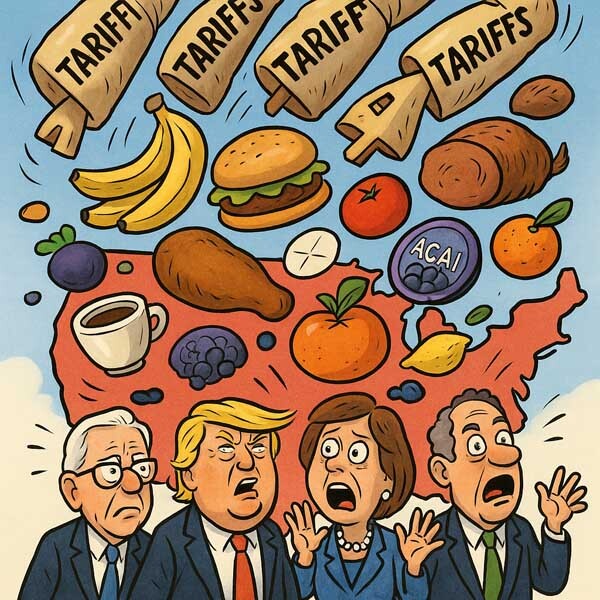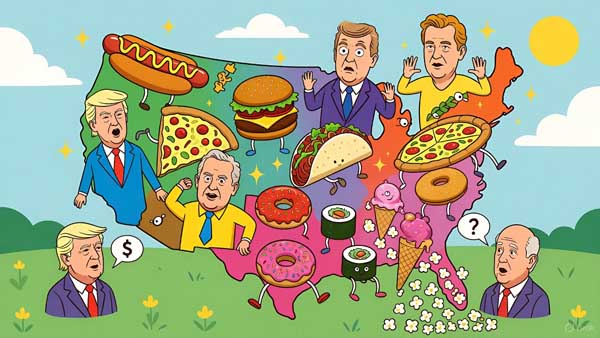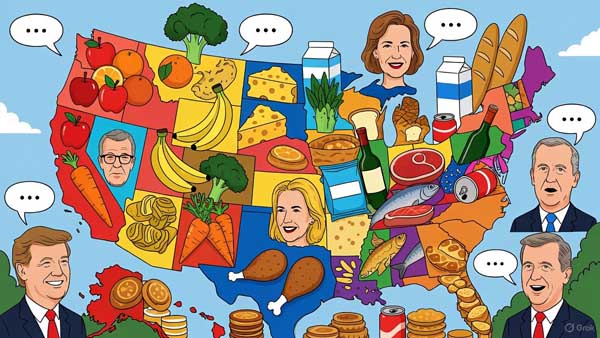News Staff![]() November 15, 2025
November 15, 2025
1K views 0 Comments 0 Likes

JTFMax OP
Tariff Tango
Washington is once again performing its favorite national dance: the Tariff Tango, a spectacle so elaborate that officials might as well have built themselves a Golden Ballroom just to practice the steps. Leaders glide confidently into bold policy stances, spin dramatically when voters get dizzy, then moonwalk politely back to where they started—pretending it was all intentional.
This week’s choreography stars the president, who quietly rolled back tariffs on more than 200 food products ranging from coffee and beef to bananas and communion wafers. Yes, even church snacks made the list, proving that nothing says “policy reversal” quite like easing the cost of spiritual carbohydrates.

The rollback arrived retroactively—always a nice touch—after months of White House insistence that tariffs were not raising prices, even as shoppers clung to grocery receipts like courtroom evidence. But inflation anxiety is real, particularly when ground beef is nearly 13% higher than last year and steaks have climbed 17%. Economists have spent months warning that tariffs contribute to these increases, though many voters didn’t need economists; they just needed a grocery cart and a pulse.
Of course, the president isn’t the only one whose policies have tripped over their own shoelaces. Democrats, eager to remind us they too have grumbled about affordability, criticized the administration for igniting inflationary sparks. This is fair, though a bit like firefighters yelling at each other over who forgot to clean the hose while the house is still smoldering. The truth is bipartisan: nobody has fully tackled rising food costs, and both parties have been hopping from issue to issue like toddlers in a toy store—enthusiastic, loud, and rarely finishing what they start.
The rollback accompanies framework trade deals with Argentina, Ecuador, Guatemala and El Salvador, which could eventually eliminate tariffs on key imports—good news for fruit bowls, coffee lovers, and anyone who starts their day with a banana and ends it with an acai smoothie. The administration argues these agreements make trade more “reciprocal,” a word Washington deploys when something sounds good but is too complicated to explain before the next commercial break.
Consumers, meanwhile, remain unimpressed. They’ve watched prices rise for over a year, with overall food-at-home costs up 2.7%. They’ve heard promises of tariff-funded “dividends,” watched supply chains tangle like holiday lights, and seen industries cheer or groan depending on whether their items landed on the exemption list. Spirits producers, for example, were left out entirely—meaning a glass of Scotch might remain the most honest way to cope with global trade policy.

Still, there is hope that cheaper coffee and beef could bring some relief, even if small. But the bigger picture—a decades-long political inability to address affordability with discipline and consistency—remains stubbornly unchanged. Leaders talk about inflation as if it’s weather: unpredictable, unfortunate, and definitely someone else’s fault.
As tariff policies continue to zigzag, one truth stands firm: millions of Americans simply want groceries they can afford and leaders who can focus long enough to deliver that reality. And if our elected officials could stop treating trade policy like a mood swing, that would be great, too.
Until then, the Tariff Tango continues—costly, chaotic, and danced mostly by officials wealthy enough not to notice the price of coffee in the first place.

Desert Local News is an invitation-only, members-based publication built on fact-checked, non-biased journalism.
All articles are publicly visible and free to read, but participation is reserved for members—comments and discussion require an invitation to join.
We cover local, state, and world news with clarity and context, free from political agendas, outrage, or misinformation.
Comments